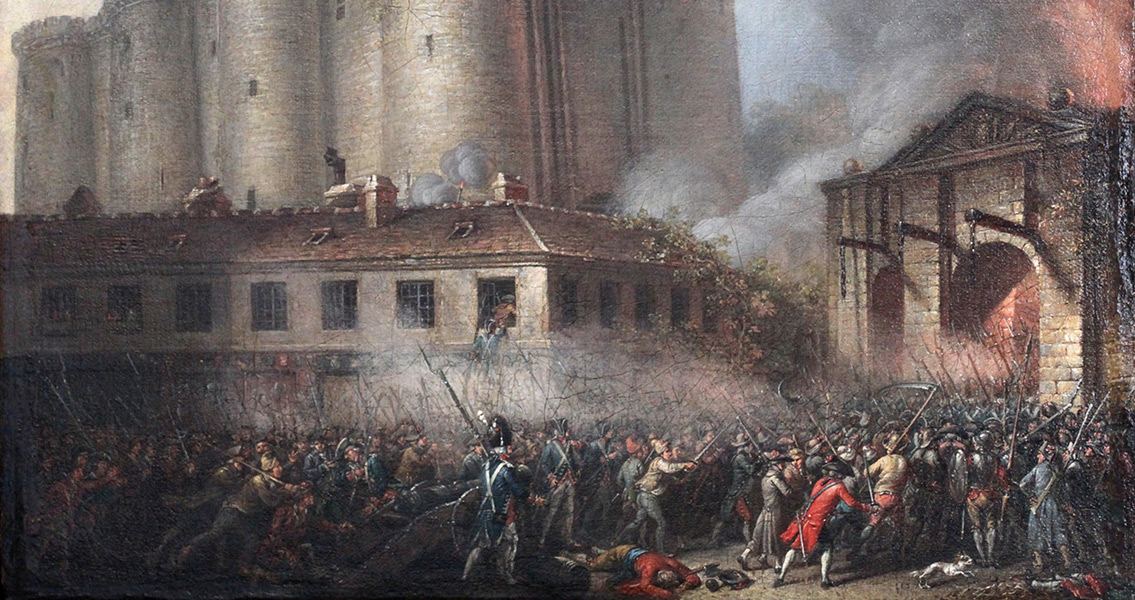<![CDATA[On 14th July 1789, the Storming of the Bastille took place in the heart of Paris. An explosion of civil unrest which saw some of the poorest in French society storm one of France's most recognisable buildings, it marked the breakout of the French Revolution . An unmistakable landmark on the eighteenth century Paris skyline, the Bastille was a thirty metre tall, eight tower fortress that had been constructed during the fourteenth century. Situated on the eastern side of the city, the ominous looking building was intended to defend Paris from attackers. Inextricably linked to the tyranny of the French monarchy, the fortress had been used to house political prisoners at various points in its history. During the reign of Louis XIII, the fortress was used to incarcerate 'enemies of the king'. The accused were arrested by secret warrant, then held indefinitely in the Bastille without trial or sentence. In July 1789 only seven prisoners were in the Bastille, and none of them had been arrested for political reasons. Nevertheless, the intimidating building remained an ever present symbol of government oppression. Perhaps the more immediate concern for those who attacked the Bastille however, were the huge stores of ammunition housed within its walls. France had been heading towards revolution throughout the summer of 1789. Poorly judged and costly involvement in the American Revolution had left the French government on the verge of bankruptcy. Years of poor cereal harvests, drought and rocketing bread prices were placing a terrible strain on the country's poor, in both the cities and the countryside, leading to outbursts of rioting, looting and striking. The economic plight of the country exploded into revolution for the simple fact it brought into clear view the injustice and inequality inherent in the French political system at the time. The poorest in society felt the brunt of the tax burden, yet saw little reward. When the consequences of bad harvests and bad wars hit the country, it was the lower classes who felt the most pain while the aristocracy continued in relative affluence. In the months leading up to the Storming of the Bastille, King Louis XVI convened a meeting of the Estates-General, an assembly representing France's clergy, nobility and middle class, to discuss changes to France's political system and economy. When the three estates convened on 5th May, the situation swiftly turned toxic, the debate descending into outright hostility between representatives from the different groups. Members of the non-aristocratic Third Estate soon started to meet separately, and established the National Assembly on 17th June with the vow of bringing constitutional reform to France to enable a more representative form of government, one which didn't afford greater voting power to those of a higher social status. Louis XVI had no choice but to agree to the Third Estate's demands, allowing the newly created National Assembly to begin work on a new constitution. On 12th July 1789 however, rumours started to spread through the capital that the King planned to deploy troops on the city's streets to seize back power and dismiss the National Assembly. Chaos fell over Paris' streets. Spurred on by members of the National Assembly and advocates of revolution such as Jean-Paul Marat, rioting and looting consumed the city as Parisians prepared for a siege. On the morning of the 14th July, a massive mob descended on the Bastille. Demanding the prison governor open the gates to allow them access to the ammunition stores, the mob charged when he refused to surrender. A bloody battle ensued, but the mob eventually took control of the Bastille, killing the governor in the process and then proceeding to carry his head through the streets on a spike. The ramifications of the events of 14th July were quickly understood across Europe. The English newspaper The World declared a few days later, “A National Revolution, brought about in a period so short, has had no parallel in the History of the World: and although fatal to some, the lives that have been lost in this great accomplishment, are, in point of numbers, inconsiderable.” In France, the anniversary of the Storming of the Bastille is a national holiday, highlighting the significance with which the event is still held. The starting point of years of revolution in the country, which only came to an end with the rise of Napoleon; the 14th July 1789 heralded the era of conflict between people and power that continues to shape history to this day. ]]>
The Anniversary of the Storming of the Bastille
